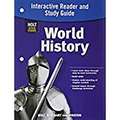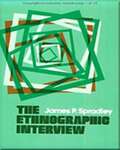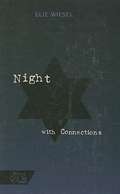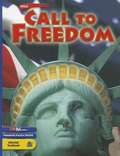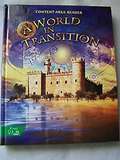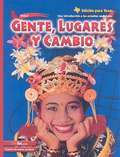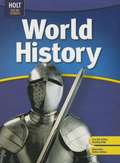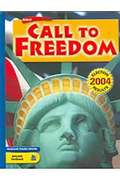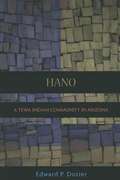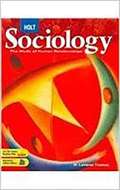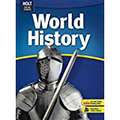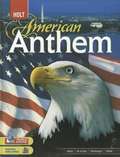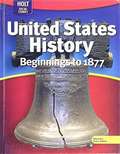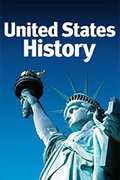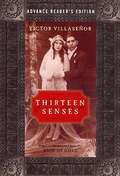- Table View
- List View
Holt American Anthem New York
by Edward L. Ayers Robert D. Schulzinger Jesús F. de la Teja Deborah Gray WhiteHolt American Anthem New York
World History: Interactive Reader and Study Guide
by Holt Rinehart and WinstonNIMAC-sourced textbook
Holt Social Studies World History, Interactive Reader and Study Guide
by Holt Winston RinehartNIMAC-sourced textbook
The Ethnographic Interview
by James P. SpradleyThe Ethnographic Interview is a practical, self-teaching handbook which guides students step by step through interview techniques commonly used to research ethnography and culture. The text also teaches students how to analyze the data they collect, and how to write an ethnography. The appendices include research questions and writing tasks.
People, Places and Change: An Introduction to World Studies (Western World)
by Holt Rinehart Winston StaffStudying geography requires the ability to understand and use various tools. This Skills Handbook explains how to use maps, charts, and other graphics to help you learn about geography and the various regions of the world. Throughout this textbook, you will have the opportunity to improve these skills and build upon them.
Night, with Connections
by Elie WieselWiesel's account of his survival as a teenager in the Nazi death camps, including a new preface is which he reflects on the enduring importance of Night and his lifelong, passionate dedication to ensuring that the world never forgets man's capacity for inhumanity to man.
Call to Freedom
by Sterling Stuckey Linda Kerrigan SalvucciRight now at this very second, somewhere in the United States, someone is making history. It is impossible to know whom or in what way, but the actions of people today may become the history of tomorrow.
A World in Transition: The Fall of Rome to the Early Modern Era (Content-Area Reader)
by Judith IrvinUsing real life illustrations and events, the book takes the student through the history of Rome, including the lives of its leaders, culture, art and battles.
Gente, Lugares y Cambio: Una Introduccion a los Estudios Mundiales
by Robert J. Sager David M. Helgren Alison S. BrooksSpanish version of "People, Places and Change," a social studies textbook about world culture.
Call to Freedom: Beginnings to 1877 (Grade #8)
by Sterling Stuckey Linda Kerrigan Salvucci Judith IrvinCall to Freedom begins every chapter with a set of theme statements under the heading "You Be the Historian." These statements are drawn from several broad themes central to American history: Geography; Economics; Government; Citizenship; Culture; Science, Technology & Society; Constitutional Heritage; and Global Relations.
Science: Technology and Society Sourcebook
by Holt Rinehart Winston StaffScienceplus Sourcebook for High School
Holt Sociology: The Study of Human Relationships
by W. Laverne ThomasMuch of the writing in this textbook is summarizing. The sociological data in this textbook has been collected from many sources. Summarizing all the characteristics of a society or even a social institution involves studying a large body of demographic, cultural, economic, geological, and historical information. Finding the Main Idea is the ability to identify the main point in a set of information. This textbook is designed to help you focus on the main ideas in sociology. The Read to Discover questions in each chapter help you identify the main ideas in each section. Identifying points of view helps us examine why people see things as they do. It also reinforces the realization that people's views may change over time or with a change in circumstances. Analyzing Information is the process of breaking something down into parts and examining the relationships between those parts. Comparing and Contrasting involve examining events, points of view, situations, or styles to identify their similarities and differences. Comparing focuses on both the similarities and the differences. Contrasting focuses only on the differences. Studying similarities and differences between people and things can give you clues about social theories, human interaction, and societies.
Science Plus: Technology & Society, Level Red
by Editors at Holt Rinehart WinstonLearn more about how science interacts with society in this textbook.
Civics in Practice Principles of Government and Economics (North Carolina)
by Gregory I. MassingNIMAC-sourced textbook
(North Carolina) American Anthem
by Edward L. Ayers Robert D. Schulzinger Jesús F. de la Teja Deborah Gray WhiteNIMAC-sourced textbook
Holt American Anthem
by Edward L. Ayers Robert D. Schulzinger Jesús F. de la TejaNIMAC-sourced textbook
United States History Beginnings to 1877
by William Deverell Deborah Gray WhiteHistorians use paintings along with many other tools to help understand the past. As you study United States history, you too will learn how to use different historical sources to Read like a Historian.
Holt Social Studies: United States History
by William Deverell Deborah Gray WhiteNIMAC-sourced textbook
Holt American Anthem: Reconstruction to the Present
by Edward L. Ayers Robert D. Schulzinger Jesús F. de la Teja Deborah Gray WhiteNIMAC-sourced textbook
Thirteen Senses: a Memoir
by Victor Edmundo VillaseñorThirteen Senses continues the exhilarating family saga that began in the widely acclaimed bestseller "Rain of Gold. Thirteen Senses begins with the fiftieth wedding anniversary of the aging former bootlegger Salvador and his elegant wife, Lupe. When asked by a young priest to repeat the sacred ceremonial phrase "to honor and obey," Lupe surprises herself and says. "No, I will not say 'obey.' How dare you! You don't talk to me like this after fifty years of marriage and I now knowing what I know!" After the hilarious shock of Lupe's rejection of the ceremony, the Villasenor family is forced to examine the love that Lupe and Salvador have shared for so many years -- a universal, gut-honest love that will eventually energize and inspire the couple into old age. In "Thirteen Senses, Victor Villasenor brings readers into the Bonnie-and-Clyde-like world of his colorful, immigrant family: a world set in Depression-era Southern California: a harsh world, where only the wily and strong survive, and where love, passion, and commitment to "familia are the sole dependable forces in Lupe's and Salvador's lives. In the unfolding of their story, we see Lupe move beyond her young and naive conventions of femininity to become a vessel of power, strength, courage, and brains.

